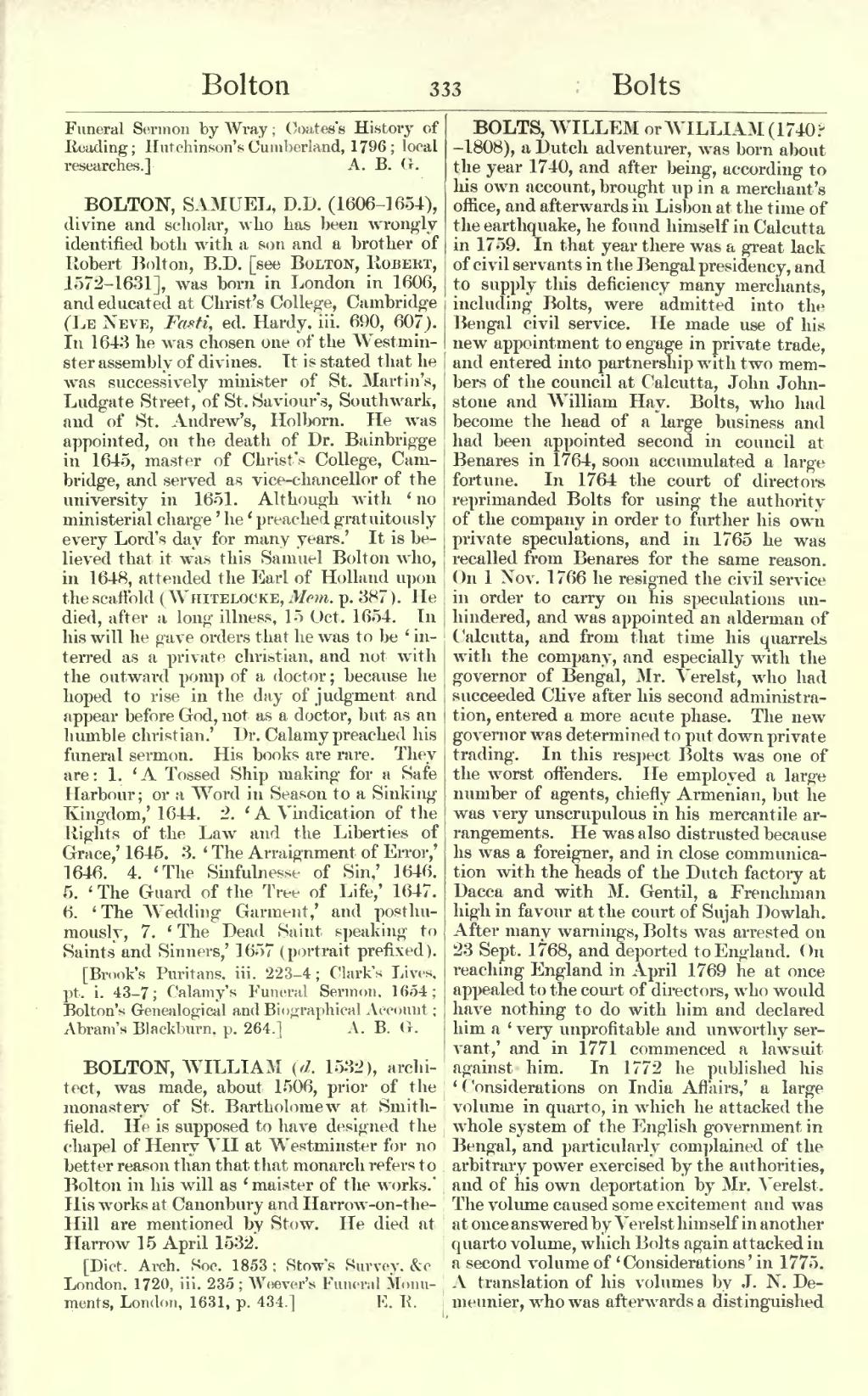BOLTON, SAMUEL, D.D. (1606–1654), divine and scholar, who has been wrongly identified both with a son and a brother of Robert Bolton, B.D. [see Bolton, Robert,1572-1631], was born in London in 1606, and educated at Christ's College, Cambridge (Le Neve, Fasti, ed. Hanly, iii. 690, 607). In 1643 he was chosen one of the Westminster assembly of divines. It is stated that he was successively minister of St. Martin's, Ludgate Street, of St. Saviour's, Southwark, and of St. Andrew's, Holborn. He was appointed, on the death of Dr. Bainbrigge in 1646, master of Christ's College, Cambridge, and served as vice-chancellor of the university in 1651. Although with 'no ministerial charge' he 'preached gratuitously every Lord's day for many years.' It is believed that it was this Samuel Bolton who, in 1648, attended the Earl of Holland upon the scaffold (Whitelocke, Mem. p. 387). He died, after a long illness, 15 Oct. 1654. In his will he gave orders that he was to be 'interred as a private christian, and not with the outward pomp of a doctor; because he hoped to rise in the day of judgment and appear before God, not as a doctor, but as an humble christian.' Dr. Calamy preached his funeral sermon. His books are rare. They are: 1. 'A Tossed Ship making for a Safe Harbour; or a Word in Season to a Sinking Kingdom,' 1644. 2. 'A Vindication of the Rights of the Law and the Liberties of Grace,' 1646. 3. 'The Arraignment of Error,' 1646. 4. 'The Sinfulnesse of Sin,' 1646. 5. 'The Guard of the Tree of Life,' 1647. 6. 'The Wedding Garment,' and posthumously, 7. 'The Dead Saint speaking to Saints and Sinners,' (portrait prefixed).
[Brook's Puritans, iii. 223-4; Clark's Lives, pt. i. 43-7; Calamy's Funeral Sermon, 1654; Bolton's Genealogical and Biographical Abram's Blackburn, p. 264.]
BOLTON, WILLIAM (d. 1532), architect, was made, about 1506, prior of the monastery of St. Bartholomew at Smithfield. He is supposed to have designed the chapel of Henry VII at Westminster for no better reason than that that monarch refers to Bolton in his will as 'maister of the works.' His works at Canonbury and Harrow-on-the-Hill are mentioned by Stow. He died at at Harrow 15 April 1532.
[Dict. Arch. Soc. 1863: Stow's Survey, &c London, 1720, iii. 235 Weaver's Funeral Monuments, London, 1631, p. 434.]
BOLTS, WILLEM or WILLIAM (1740?–1808), a Dutch adventurer, was born about the year 1740, and after being, according to his own account, brought up in a merchant's office, and afterwards in Lisbon at the time of the earthquake, he found himself in Calcutta in 1759. In that year there was a great lack of civil servants in the Bengal presidency, and to supply this deficiency many merchants, including Bolts, were admitted into the Bengal civil service. He made use of his new appointment toengace in private trade, and entered into partnership with two members of the council at Calcutta, John Johnstone and William Hay. Bolts, who had become the head of a large business and had been appointed second in council at Benares in 1764, soon accumulated a large fortune. In 1764 the court of directors reprimanded Bolts for using the authority of the company in order to further his own private speculations, and in 1765 he was recalled from Benares for the same reason. On 1 Nov. 1766 he resigned the civil service in order to carry on his speculations unhindered, and was appointed an alderman of Calcutta, and from that time his quarrels with the company, and especially with the governor of Bengal, Mr. Verelst, who had succeeded Clive after his second administration, entered a more acute phase. The new governor was determined to put down private trading. In this respect Bolts was one of worst offenders. He employed a large number of agents, chiefly Armenian, but he was very unscrupulous in his mercantile arrangements. He was also distrusted because he was a foreigner, and in close comnmnication with the heads of the Dutch factory at Dacca and with M. Gentil, a Frenchman favour at the court of Sujah Dowlah. After many warnings, Bolts was arrested on 22 Sept. 1768, and deported to England. On reaching England in April 1769 he at once appealed to the court of directors, who would have nothing to do with him and declared him a 'very unprofitable and unworthy servant,' and in 1771 commenced a lawsuit against him. In 1772 he published his Considerations on India Ailairs,' a large volume in quarto, in which he attacked the whole system of the English government in Bengal, and particularly complained of the arbitrary power exercised by the authorities and of his own deportation by Mr. Verelst.
The volume caused some excitement and was answered by Verelst himself in another quarto volume, which Bolts again attacked in a second volume of ' Considerations ' in 1775. A translation of his volumes by J. N. Demeimier, who was afterwards a distinguished
